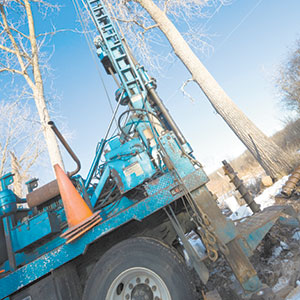Geotechnical drilling can benefit from bentonite, cement grout

|
|
During geotechnical surveys, grout made of bentonite and cement is much more stable and can help yield more accurate measurements. Source: iStock |
Borehole instrumentation is sensitive and needs to be properly backfilled to get accurate readings. The backfill material is in contact with the instrumentation and the formation, but does not get the attention it warrants.
Borehole Grout
Bentonite alone is not stable enough and can influence measurement devices. A grout made of bentonite and cement is much more stable.
Grout stability is crucial at the liquid and set stage. It should be thick and smooth, but still pumpable. If the grout is too liquid, it will result in bleeding and possibly cracking.
The sand content and filtrate are also very important and often overlooked. These should be tested before bentonite is used. With a higher sand content, we see a thicker filter cake and more filtrate. Zonal isolation cannot be achieved with inferior or over-treated bentonite. I recommend using the purest/untreated bentonite available.
So, let’s look at how the sodium in bentonite can properly yield if it is competing for water with the calcium in cement:
- Calcium exchange is not instantaneous. It takes time, which means that there is at least some amount of hydration, swelling and viscosification potential. This is why we see a fairly dramatic increase in viscosity when the bentonite is added to the cement. If this were an instantaneous conversion, we would see no more viscosity increase than if we simply added sand.
- Calcium acts to strongly flocculate hydrated bentonite, forming a mix with very high suspension ability. We actually pre-mix the cement first to limit this. If we added the bentonite first and allowed it to fully yield and then added calcium, we would likely create an overly thick, peanut-butter-like consistency rather than a pumpable fluid.
- The addition of bentonite, even if the calcium exchanged slowly, will lower permeability values due to the plate-like shape and extremely small size of the particles.
- The primary force driving low permeability in cement-bentonite grouts is actually the cement. Cement is always semi-soluble (decreasing over time). This means that calcium will solubilize as water migrates through and re-deposits in voids and cracks. Cement, even at very high solids content will start out having a very high permeability, but over time this can drop to values even lower than what bentonite can achieve in fresh water. We are talking about tens of years though. The low permeability values offered by bentonite are immediate. By adding some bentonite to cement, we can take advantage of this immediate low permeability and still benefit from the lower potential permeability of cement many years after installation.
- There is a benefit to using powdered bentonite with cement since we want to have the most surface area available for water uptake prior to calcium exchange. Very good mixing is generally recommended so that the bentonite is as dispersed as possible. There are some thoughts that the bentonite at the mixing stage has fully yielded and has no more healing capabilities, and that coarse bentonite can offer different capabilities to further hydrate, swell and then re-seal.
It is important to note that the bentonite and water is not mixed first as it is in drilling applications. Bentonite is slowly added to the water and cement mixture. Cement and water are mixed first so that strength and modulus are more predictable. Also, more bentonite can be added to lower permeability for sealing.
Controlling shifting, movement
Another aspect often overlooked is controlling shifting and movement in the borehole. By adding even a small amount of bentonite to the cement, we create elasticity in the grout. This elasticity allows the grout column to flex with any ground movement and protect the borehole instruments.
The practice of hydrated bentonite with cement added last is still widely used. However, this method requires industrial mixing equipment, and the cement content is hard to control. This is another segment that requires more study.
In the geotechnical industry, we still see boreholes backfilled with only cement. Like most other industries, the advantages of different technology can take time and an open mind. The use of bentonite and cement to grout boreholes can be the normal way of doing business with proper education and training. Major bentonite companies have qualified field service technicians available to train and educate your employees.
Rick Hennessy is territory sales manager for CETCO Drilling Products. For more Drilling Fluids columns, visit www.thedriller.com/drillingfluids.
Looking for a reprint of this article?
From high-res PDFs to custom plaques, order your copy today!




